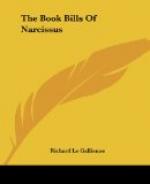One quaint instance of this earnest attitude in all things occurs to me out of his schooldays. He was a Divine Right man, a fiery Jacobite, in those days; and, probably not without some absurd unconfessed dream in his heart that it might somehow help the dead old cause, he one afternoon fluttered the Hanoverian hearts—all the men we meet in street and mart are Hanoverians, of course—of our little literary club by solemnly rising ‘to give notice’ that at the following meeting he would read a paper to prove that ’the House of Hanover has no right to the English throne.’ Great was the excitement through the fortnight intervening, extending even to the masters; and the meeting was a full one, and no little stormy.
Narcissus rose with the air of a condemned Strafford, and with all his boyish armoury of eloquence and scorn fought over again the long-lost battle, hiss and groan falling unheeded into the stream of his young voice. But vain, vain! hard is the Hanoverian heart in boy, as in man, and all your glowing periods were in vain—vain as, your peroration told us, ‘was the blood of gallant hearts shed on Culloden’s field.’ Poor N., you had but one timorous supporter, even me, so early your fidus Achates—but one against so many. Yet were you crestfallen? Galileo with his ‘E pur si muove,’ Disraeli with his ‘The time will come,’ wore such a mien as yours, as we turned from that well-foughten field. Yes! and you loved to take in earnest vague Hanoverian threats of possible arrest for your baby-treason, and, for some time, I know, you never passed a policeman without a dignified tremor, as of one who might at any moment find a lodging in the Tower.
But the most serious of all N.’s ‘mad’ enthusiasms was that of which the Reader has already received some hint, in the few paragraphs of his own confessions above, that which ‘had almost sent him to the Himalayas.’
It belongs to natures like his always through life to cherish a half belief in their old fairy tales, and a longing, however late in the day, to prove them true at last. To many such the revelations with which Madame Blavatsky, as with some mystic trumpet, startled the Western world some years ago, must have come with most passionate appeal; and to Narcissus they came like a love arisen from the dead. Long before, he had ‘supped full’ of all the necromantic excitements that poet or romancer could give. Guy Mannering had introduced him to Lilly; Lytton and Hawthorne had sent him searching in many a musty folio for Elixir Vitas and the Stone. Like Scythrop, in ‘Nightmare Abbey,’ he had for a long period slept with horrid mysteries beneath his pillow. But suddenly his interest had faded: these phantoms fled before a rationalistic cock-crow, and Eugenius Philalethes and Robert Fludd went with Mejnour and Zanoni into a twilight forgetfulness. There was no hand to show the hidden way to the land that might be, and there were hands beckoning and voices calling him along the highway to the land that is. So, dream-light passing, he must, perforce, reconcile himself to daylight, with its dusty beam and its narrow horizons.




